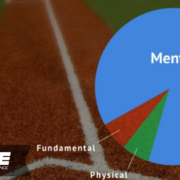The Key to Building Confidence as a Baseball Player
We have all heard of the term “confidence” and I am sure we can all agree that it is of vital importance to a baseball player’s progress and development.
Yogi Berra put it best, “Baseball is 90 percent mental and the other half is physical.”
Although gaining and developing confidence to some may seem like an easy task, similar to a switch you can simply flip on and off, for some ballplayers, confidence is the single greatest flaw in their game and what ultimately prevents them from maximizing their potential.
Having struggled mightily with confidence over the years, I want to take this brief moment and share with you a couple thoughts that I have found useful that I believe you will be able to implement and benefit from right away.
Struggling with Confidence
First and foremost, I believe the most important element within all of this, is having the ability to be comfortable within your own skin as a human being. Before anyone steps on the baseball field, it is absolutely crucial that they love themselves as a human being and whole heartedly accept their reflection in the mirror regardless of how their box score reads after the game.
If this proves to be difficult, it will undoubtedly be more challenging to remain confident during times of struggle on the field. Baseball is arguably one of the most difficult sports and the success rate will be minimal compared to the amount of failure you will endure as a ballplayer.
For many years I would base my self worth off of the amount of hits I recorded, the number of runners I threw out or the MPH reading that would flash on the radar gun. This is not a healthy, ideal, or practical way to live life and it is not sustainable over time.
You have to be able to compartmentalize between life as a ballplayer and life as a human being.
When you truly come to grips with the notion (it’s hard, trust me) that I am a worthy human being, regardless of my performance on the field, a huge weight will be lifted off your shoulders, allowing you to play free, loose, and relaxed. Soon thereafter, baseball will become much more enjoyable.
As a ballplayer, we must come to grips with the notion that regardless if we go 5 for 5 or 0 for 5 at the plate, our family and true friends will still love us unconditionally and their opinion of us will not waver based on our athletic development or achievements.
A parent will love you for the individual you are, not the batting average you maintain.
A true friend will want to spend time with you because they enjoy your company, not because you hit the game winning home run.
Your significant other will love you because of how you make them feel, not your average fastball velocity.
As a ballplayer and especially as a young child, it is crucial to always remember that those who truly love you will always love you, regardless of how the scoreboard reads. This is by no stretch an easy concept to grasp and it is a difficult lesson to learn.
The day after my first shoulder surgery, I had 35 missed calls, 43 text messages and 8 voicemails. The day after my fifth shoulder surgery, I had 4 missed calls, 6 text messages and zero voicemails. That experience allowed me the opportunity to see who truly loved me and who just loved the idea of me.
One of the most detrimental acts any ballplayer can partake in is directly comparing themselves to those who surround them. This is a recipe for disaster on a variety of levels. Day in and day out, the goal of any ballplayer should be to win the battle against themselves and focus solely on that reflection in the mirror.
We all understand that baseball is a team game, but if you begin comparing yourself to others around you, you will stunt and even derail your potential growth as a ballplayer. It is irrelevant if Billy hit a home run today or Nick made the game winning catch. All that matters is, did I, myself, improve today and am I better today than I was yesterday.
The greatest achievers in any industry have an internal drive, allowing self-improvement to be their exclusive focus and concern. In addition to holding themselves to the highest standards, they judge their performance solely against preceding versions of themselves, not against teammates or competitors.
Each and every one of us develop, mature and progress at our own pace and on our own timetable. None of us are genetically equivalent, so what is the sense in comparing ourselves to others based on factors that are out of our control?
Many often forget that this game, similar to life, is a marathon, not a race.
Barrett Snyder
Latest posts by Barrett Snyder (see all)
- The Key to Building Confidence as a Baseball Player - November 28, 2017










Good